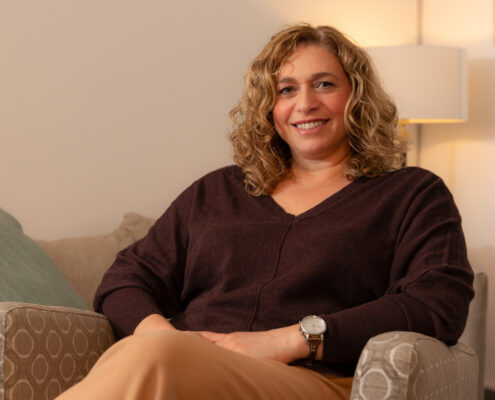Rosanna Pingitore | Clinical Psychologist
BBehavSc(Psych), Dip Yoga, GradDipPsych, Hons (Psych), MPsych (Clinical)
I believe that we can come to understand the interrelationship between our thoughts, feelings, physical sensations, and actions, and through this process heal psychological distress. I am drawn to help people become more aware of this process and learn how to unwind patterns in thinking and behaviours that are holding them back. As an experienced teacher of yoga and meditation as well as a psychologist, I draw on body work and meditation to develop helpful new coping behaviours and life skills.
I work with couples experiencing conflict, relationship distress, separation, and stress related to becoming new parents or raising family (couples therapy).

Rosanna Pingitore | Psychologist
I have a special interest in the integration of body and mind which is often negatively impacted after trauma, among people who are neurodiverse, and among those with a body image concerns.
I also work with children (from 8 years) and adolescents experiencing emotional distress including anxiety and irritability, health anxiety, adjustment after injury/illness, and trauma.
Adult presentations that I work with include:
- General anxiety, health anxiety
- Depression
- Trauma and post-traumatic stress
- Generalised stress
- Life transitions leading to distress
- Existential crises
- Phobias
- Adjustment to illness/injury
- Relationship difficulties , including couples therapy
I primarily practice Cognitive Behavioural Therapy (CBT) with a mindfulness base. My treatments are influenced by the research of Dr Van Der Kolk (Boston Trauma Centre), the Polyvagal Theory (Porges), The Gottman Method, and the neuroscience of psychotherapy (Louis Cozolino). My approach is person centred and collaborative. That is, we will work as a team and the therapy will be guided by your goals, aspirations, and needs.
An interview with Rosanna Pingitore
Why did you become a psychologist?
I became a psychologist because I am endlessly fascinated about the human experience. It started early for me as a a Year 12 student reading Victor Frankel’s Man’s Search for Meaning. This really piqued my interest. And it’s continued ever since I’m fascinated by human biology, human neurobiology and that connection between mind and body. I’m also a yoga teacher. So there’s that connection there. And that fascination about human beings, people’s lives, their experiences – it’s something that stays with me every single day.
What are you passionate about in Psychology?
I’m most passionate and interested in that connection between mind and body. How that connection plays out in people’s lives, their traumas, their experiences. It’s at the core of the work I do, helping people understand how their problems or issues came about. And then using that understanding to work out how we solve their problems and issues.
What gives you a sense of satisfaction?
I’m most satisfied when I see that light go on in people’s minds when they have that ‘aha moment’, and it energizes them and their commitment to therapy.
What can a client expect in their first session?
In the first session, the client can very much expect a get to know you session. I focus on getting to know them, their lives, interests, the things that have influenced them. From there, my focus is figuring out what they want to get out of therapy, what their goals for therapy are. I find that the first session is one of the most fascinating things about this role. Here is a person who’s coming to meet me for the first time, they don’t know me and I don’t know them but yet there’s an expectation that we’re going to have a very deep conversation. Sometimes it puts a lot of pressure on people so I like to take the pressure off, be very personable, get to know them as best I can and put them at ease.
